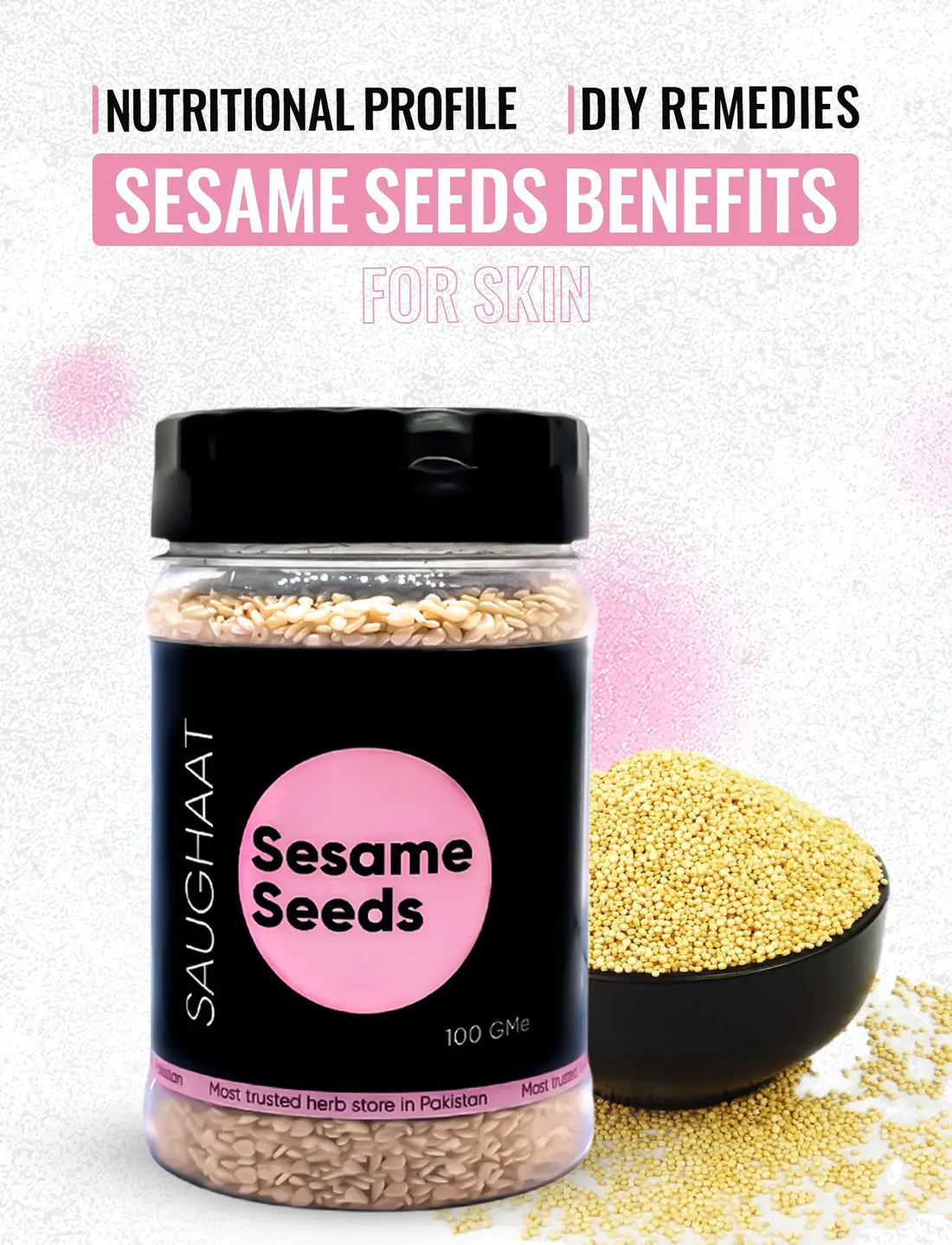
Nutritional Profile, DIY Remedies and Sesame Seeds Benefits for Skin
Share
Sesame Seeds in Urdu are known as Til ke beej. These small but mighty seeds have been cherished for centuries for their exceptional flavor, versatility, and numerous health benefits. These tiny treasures are more than just toppings for buns; they play a significant role in many cuisines worldwide and have a long history in traditional medicine and cultural symbolism. These seeds come in various colors, including white, black, and brown. The white till ke beej are the most common and are known for their mild, nutty flavor. Black till ke beej are popular in Asian cuisine and have a slightly stronger, earthy taste. Brown till ke beej offer a more robust, nuttier flavor and are often used in baking.

Nutritional Profile
These seeds are nutrition powerhouses, packed with essential nutrients that can benefit your health in various ways. Here's a breakdown of the key nutritional components of these seeds:
Macronutrients:
- Protein: These seeds are a good source of plant-based protein, making them an excellent option for vegetarians and vegans.
- Fats: They contain healthy fats, primarily monounsaturated and polyunsaturated fats, which are heart-healthy.
- Carbohydrates: These seeds are relatively low in carbohydrates, making them suitable for low-carb diets.
Vitamins:
- Vitamin B1 (Thiamine): Supports energy metabolism.
- Vitamin B3 (Niacin): Aids in skin health and digestion.
- Vitamin B6 (Pyridoxine): Important for brain development and function.
Minerals:
- Calcium: Rich in calcium, these seeds contribute to strong bones and teeth.
- Iron: Provides an essential mineral for oxygen transport in the body.
- Magnesium: Helps with muscle and nerve function, blood glucose control, and bone health.
- Phosphorus: Essential for bone and teeth formation.
- Zinc: Supports the immune system and wound healing.
Dietary Fiber: These seeds contain dietary fiber, which aids in digestion and can help maintain a feeling of fullness.
- Antioxidants: They are rich in antioxidants like sesamin and sesamol, which help combat oxidative stress and reduce inflammation in the body.
- Lignans: These seeds are one of the best sources of lignans, which have been associated with various health benefits, including hormone balance and heart health.
- Protein: These seeds are relatively high in protein, making them a valuable addition to vegetarian and vegan diets.
- Phytosterols: These naturally occurring compounds can help lower cholesterol levels.
Benefits for Skin
Sesame Seeds benefits for skin are numerous, thanks to their rich nutritional profile and natural compounds. Here's how these seeds can contribute to healthier and more radiant skin:
- Moisturization: Sesame oil, derived from these seeds, is an excellent natural moisturizer. It helps lock in moisture, making it a suitable choice for dry or flaky skin. Applying sesame oil to the skin can leave it feeling soft and hydrated.
- Antioxidant Properties: These seeds are rich in antioxidants, such as sesamin and sesamol. These antioxidants help protect the skin from free radical damage, which can lead to premature aging. Regular consumption of these seeds or topical application of sesame oil can help maintain youthful skin.
- Anti-Inflammatory: The anti-inflammatory properties of these seeds can be beneficial for individuals with skin conditions like eczema or psoriasis. The application of sesame oil can help soothe irritated skin and reduce redness and itching.
- Natural Sunscreen: Sesame oil contains natural sun-blocking properties, with an SPF of around 4-10. While it's not a substitute for dedicated sunscreen, applying sesame oil can provide some protection against the sun's harmful UV rays. However, it's crucial to use it in combination with a proper sunscreen for extended sun exposure.
- Wound Healing: Sesame oil has been traditionally used to aid wound healing. Its antibacterial properties can help prevent infection, and its anti-inflammatory effects can reduce swelling and promote faster recovery.
- Cleansing: Sesame oil can be used as a natural cleanser for the skin. The oil helps remove dirt and impurities while keeping the skin's natural moisture intact. This makes it a suitable option for individuals with sensitive or dry skin.
- Acne Control: The antimicrobial properties of sesame oil can help combat acne-causing bacteria. Additionally, the anti-inflammatory nature of these seeds can reduce the redness and swelling associated with acne.

DIY Remedies
To use these seeds for your skin, you can:
- Sesame Oil Massage: Gently massage a small amount of sesame oil onto your skin before bedtime. Leave it on overnight and rinse in the morning for soft and supple skin.
- Exfoliating Scrub: Mix these seeds finely ground seeds with a bit of yogurt or honey to create a natural exfoliating scrub. Use this mixture to gently exfoliate your skin, removing dead skin cells and leaving your skin refreshed.
- Sesame Seed Paste: Create a paste by grinding these seeds and mixing them with water. Apply this paste to your face as a face mask. It can help cleanse the skin and provide a healthy glow.
- Incorporate in Diet: Regularly consuming these seeds in your diet can also contribute to skin health. The vitamins, minerals, and healthy fats in these seeds nourish your skin from the inside out.
While these seeds can benefit the skin, it's important to perform a patch test before using sesame oil or any new skincare product to ensure you don't have an adverse reaction. If you have specific skin concerns or conditions, it's advisable to consult with a dermatologist for personalized recommendations.
Side Effects
Although Sesame Seeds side effects are minimal to none. But, it's important to note that while these seeds offer numerous health benefits, they are also calorie-dense, so portion control is key, especially if you are mindful of calorie intake. Additionally, for individuals with allergies, it's crucial to be aware of potential sesame seed allergies, which can range from mild to severe.
Conclusion
Including these seeds in your diet can add a delightful nutty flavor and provide a wealth of nutrients that contribute to overall well-being. Whether sprinkled on salads, used in cooking, or as a component in various dishes and condiments, Sesame Seeds are a versatile and nutritious addition to your culinary repertoire.
